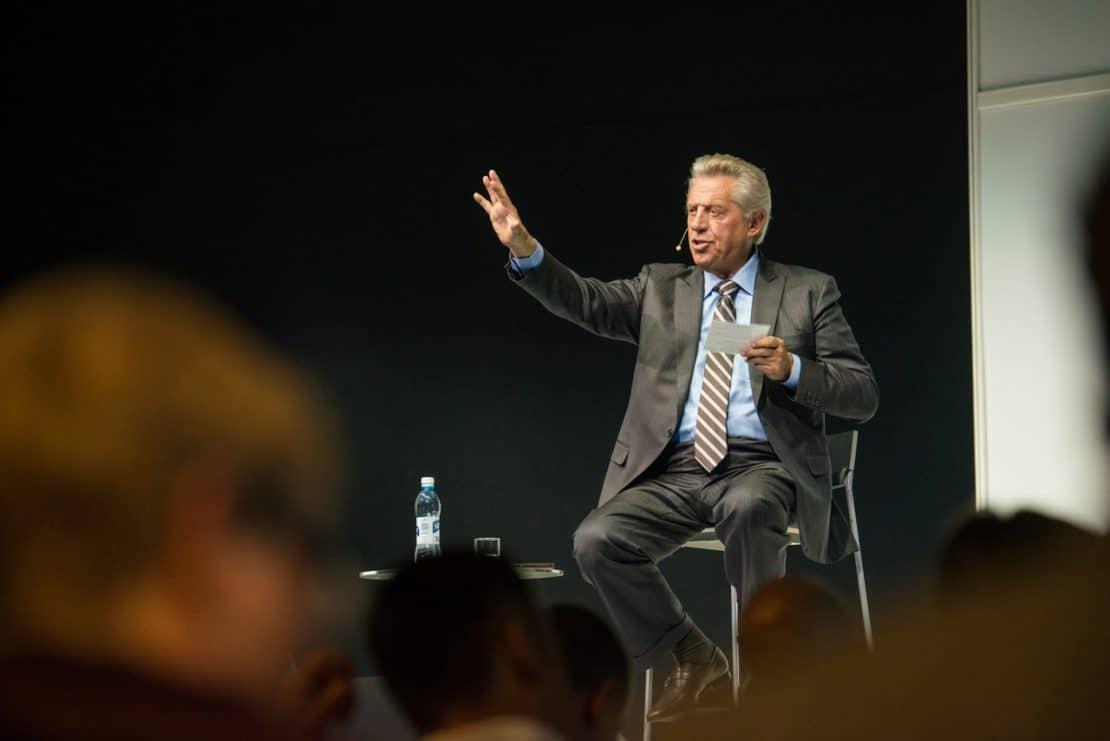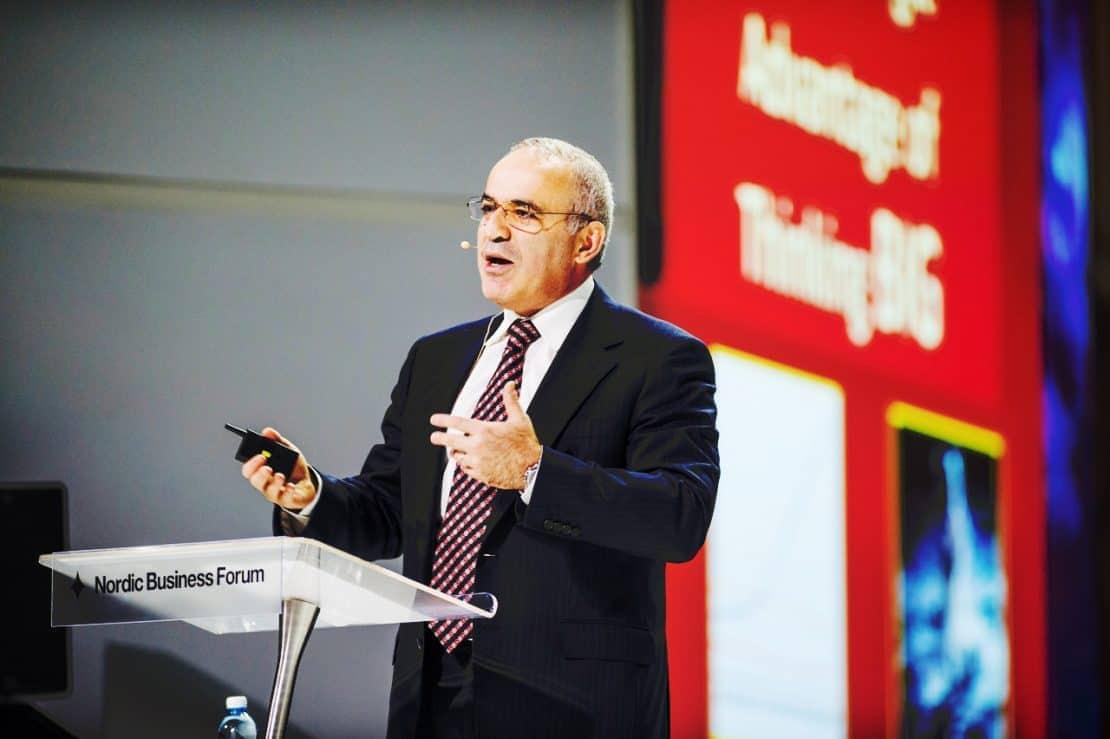17Dec2015
False assumptions can lead to leadership disasters, but luckily wrong assumptions can be tackled if one is willing to ask the right questions.
I am privileged to sit on one of the front rows listening to Mr. John C. Maxwell giving the 1,100 VIP guests an awesome kick-start presentation for the Nordic Business Forum 2015 seminar. A man who has written over 70 books and sold a stunning 25 million copies and more, sits comfortably and tells a few funny stories before commencing his address.
Best way to lead people is with questions
Having been sitting in the Nordic Business Forum audience for several years, I tend to wonder whether there really is anything more to cover. When this year’s main moderator, Swedish public speaker and trainer Antoni Lacinai asked Maxwell why he chose this topic from among all the possible options he briefly explained how most people understand leading people, and continued that, ”I think the greatest way to lead people is through questions”. Most certainly this is a fresh and interesting angle!
Don’t lead by assumption
”I want to tell you two stories that open up everything about why you and I as leaders should ask questions”, he starts. With enthusiasm, Maxwell jumps up from his chair and starts drawing as he tells the first story. In this narrative, the basketball coach has invited Maxwell to the locker room during the halftime break to see how she handles the team. ”Now here’s where it gets interesting”, he says and explains that the coaches leave the players and go to an adjoining room. The players have a blank marker board showing only three topics; What did we do right? What did we do wrong? What do we need to change? One of the players wrote 2-3 things under each topic in about five minutes. After this the coach walks into the locker room, looks at the answers and gives a couple of comments – this in about three minutes. When Maxwell later asked the coach what was behind the exercise, he got an interesting answer.
During the first two years the coach was not successful. She told Maxwell that she was leading by assumption. The coach had thought that she and her players were on the same page, which ultimately wasn’t true. Maxwell concludes the lesson, saying, ”Before you and I can lead people, we have to find them”.
It’s about the leader finding the followers
Maxwell creates a stunned silence by saying that leading people is not about the followers finding the leader, but the leader finding the followers. I have to say, Maxwell is a master of rhetoric. Although he is speaking about the things many leaders already know, he throws in statements that force you to stop and think. To be a great leader, you have to find the people first. You have to know where they are to take them where they are going. That was what the basketball coach’s halftime exercise was all about. Finding out what her players were thinking. Maxwell reminds that, ”You have to lead the people from the perspective of the people who are following you”.
How can I make my team better?
Maxwell starts to tell another story, this time about the greatest art of asking questions. There’s another basketball coach, who has achieved records that will never be broken. The coach kept on asking himself one single question every day. Every single day. Maxwell teases and amuses the audience by not telling the question right away – but soon reveals the secret. ”How can I make my team better?”, he says the coach asked every day. Now, this might sound like a hard question, but the coach found the answer. He had to become better every day. Of course! These are the kinds of ideas that seem obvious, but you might not think about nor realize them until someone like Maxwell throws them at you. Being a business and people leader, you have to become better every day.
Everything rises and falls on leadership
Most certainly Maxwell knows what he is talking about. With his five companies, outstanding book sale record and a career spanning 40-plus years, we are looking at a man who knows leadership. With enthusiasm he explains that everything rises and falls on leadership, no matter if it is a country, a culture, education, business, religion or anything else in that matter. History has proven him right.
Be intentional!
Maxwell says a good leader is always investing in himself to be able to help others grow. He says that as a leader you cannot give what you don’t have. Furthermore, the best way to grow a company is to grow the leaders of the company. After a couple of minutes Maxwell drops the silencer again: be intentional. I noticed the majority of the audience nodded towards their notebook, for a reason. He continues about being intentional and tells that nobody has ever built a company on good intentions. Nobody ever did anything significant on good intentions. In fact, there’s a whole world of difference between people with good intentions and those who live intentionally. The key is when good intentions turn into good actions. If you don’t live intentionally, you will never maximize your potential. That is somewhat scary, at least for me.
Have a growth plan
At the age of 68, Maxwell still has a personal growth plan. In fact, he pulls a card out of his pocket and says he wrote that very card over 40 years ago. He presents the 10 points from the card while the audience is eagerly taking notes and learning every possible bit from him. Every point starts with ”a growth environment is a place where…” At this point I wonder how many people in the world have such a concrete plan and keep it in their pocket unchanged for over 40 years.
Invest in the right people
If you remember Jim Collins’ presentation from Nordic Business Forum 2014, you remember that a leader needs to have the right people on the bus. Maxwell takes it a step further and urges us to ask if we are investing in the right people. He says that followers expect their leaders to give them energy, time and thinking. The challenge is that a leader cannot equally invest in everybody. So, how would you know if the person to invest is the right one? Maxwell’s principle is that you should do for one something that you wish you could do for many. He pulls out and explains in detail the series of questions that help him decide who is the right person to invest in. Questions cover the person’s influence, capacity, attitude, chemistry, passion, character, values, teamwork and creativity factors. Maxwell reminds us that good leaders are interested in people. Some even love them.
Questions followers should ask leaders
Towards the end Maxwell pulls more aces from his sleeve. During the last very minutes he presents three questions followers should ask their leaders regardless of the country or the culture; 1) Do you like me? 2) Can you help me? 3) Do you trust me? People follow leaders who can help them grow. Maxwell concludes his presentation by reminding every leader to turn the questions around and ask: Do I love people? Can I help them? Am I trustworthy? That should either give three yes’s or generate a personal growth plan. What about you?
John C. Maxwell is a bestselling author, coach and speaker who has sold more than 24 million books in 50 languages. Maxwell was identified as the most popular leadership expert in the world by Inc. magazine in 2014.



